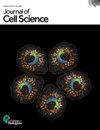NaV1.1 通过调节 AKT 和 CDK2 促进人类间充质干细胞的细胞周期。
IF 3.3
3区 生物学
Q3 CELL BIOLOGY
引用次数: 0
摘要
非兴奋细胞表达钠电压门控通道α亚基1基因和蛋白(SCN1A/NaV1.1);然而,NaV1.1的功能尚不清楚。人间质干细胞(MSCs)中表达了 SCN1A。Nav1.1在间充质干细胞的内质网中大量表达,但未发现其表达与钠电流有关。SCN1A-silencing会减少间叶干细胞的增殖,并使细胞周期延迟到S期。尽管 mRNA 的表达量相似,但 SCN1A 的沉默也抑制了 CDK2 和 AKT 的蛋白水平,并抑制了间充质干细胞中 AKT 的磷酸化。环己亚胺酶切实验表明,SCN1A-silencing 能诱导间充质干细胞中 CDK2 蛋白降解,但不能诱导 AKT 蛋白降解。使用环氧美辛、巴非罗霉素 A1 和 NH4Cl 进行的蛋白酶解抑制实验表明,泛素-蛋白酶体和自噬/内切-溶酶体系统与 SCN1A 衰竭间充质干细胞中 CDK2 和 AKT 蛋白的减少无关。AKT抑制剂LY294002并不影响间充质干细胞中CDK2的降解和核定位。同样,AKT 激活剂 SC79 也没有减弱 SCN1A 对间叶干细胞中 CDK2 的抑制作用。这些结果表明,NaV1.1 通过调控 AKT 和 CDK2 的翻译后控制来促进间充质干细胞的细胞周期。本文章由计算机程序翻译,如有差异,请以英文原文为准。
NaV1.1 contributes to the cell cycle of human mesenchymal stem cells by regulating AKT and CDK2.
Non-excitable cells express sodium voltage-gated channel alpha subunit 1 gene and protein (SCN1A/NaV1.1); however, the functions of NaV1.1 are unclear. SCN1A was expressed in human mesenchymal stem cells (MSCs). Nav1.1 was abundantly expressed in the endoplasmic reticulum of MSCs; however, its expression was not found to be related to sodium currents. SCN1A-silencing reduced MSC proliferation and delayed the cell cycle in the S phase. SCN1A-silencing also suppressed the protein levels of CDK2 and AKT, despite similar mRNA expression, and inhibited AKT phosphorylation in MSCs. Cycloheximide-chase assay showed that SCN1A-silencing induced CDK2 but not AKT protein degradation in MSCs. Proteolysis inhibition assay using epoxomicin, bafilomycin A1, and NH4Cl, revealed that the ubiquitin-proteasome and autophagy/endo-lysosome systems were irrelevant to CDK2 and AKT protein reduction in SCN1A-silenced MSCs. AKT inhibitor LY294002 did not affect the degradation and nuclear localization of CDK2 in MSCs. Likewise, AKT activator SC79 did not attenuate the SCN1A-silencing effects on CDK2 in MSCs. These results suggest that NaV1.1 contributes to the cell cycle of MSCs by regulating the post-translational control of AKT and CDK2.
求助全文
通过发布文献求助,成功后即可免费获取论文全文。
去求助
来源期刊

Journal of cell science
生物-细胞生物学
CiteScore
7.30
自引率
2.50%
发文量
393
审稿时长
1.4 months
期刊介绍:
Journal of Cell Science publishes cutting-edge science, encompassing all aspects of cell biology.
 求助内容:
求助内容: 应助结果提醒方式:
应助结果提醒方式:


